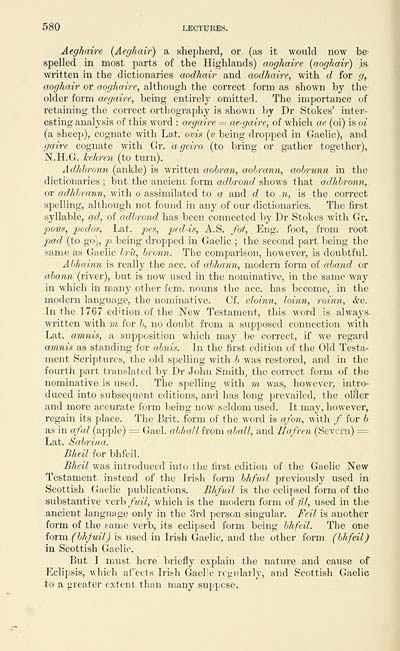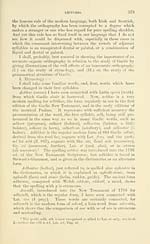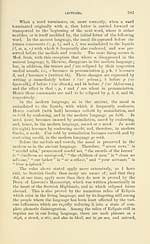Ossian Collection > Reliquiae Celticae > Volume 2
(594)
Download files
Complete book:
Individual page:
Thumbnail gallery: Grid view | List view

580 LECTURES.
Aeghaire {Aeghair) a shepherd, or (as it would now be
spelled in most parts of the Highlands) aoghaire (aoghair) i»
written in the dictionaries aodhair and aodhaire, with d for g,
aoghair or aoghaire, although the correct form as shown by the
older form aegaire, being entirely omitted. The importance of
retaining the correct orthography is shown by Dr Stokes' inter-
esting analysis of this word : aegaire = ae-gaire, of which ae (oi) is oi
(a sheep), cognate with Lat. avis (v being dropped in Gaelic), and
gaire cognate with Gr. ageiro (to bring or gather together),
N.H.G. kehreti (to turn).
xidhbronn (ankle) is written aohran, aolrann, aohrunn in the
dictionaries ; but the ancient form adhrond shows that adhhronn,
or adhhrann, with o assimilated to a and d to re, is the correct
spelling, although not found in any of our dictionaries. The first
syllable, ad, of adhrond has been connected by Dr Stokes with Gr.
jious, podo.", Lat. pes, ped-is, A.S. /of, Eng. foot, from root
2)ad (to go), p being dropped in Gaelic ; the second part being the
same as Gaelic Irv, hronn. The comparison, however, is doubtful.
Abhainn is really the ace. of abhann, modern form of aband or
abann (river), but is now used in the nominative, in the same way
in which in many other fcm. nouns the ace. has become, in the
modern language, the nominative. Of. cloinn, loinn, roinn, (tc.
In the 1767 edition of the New Testament, this word is always,
written with m for b, no doubt from a supposed connection with
Lat. amnis, a supposition which may be correct, if we regard
amnis as standing for abnis. In the first edition of the Old Testa-
ment Scriptures, the old spelling with b was restored, and in the
fourth part tnmslated by Dr John Smith, the con-ect form of the
nominative is used. The spelling with m was, however, intro-
duced into subsequent editions, and has long prevailed, the older
and more accurate form being now seldom used. It may, however,
regain its place. The Brit, form of the word is afon, with / for h
as in afal (apple) = Gael, abhall from aball, and Hat'ren (Severn) =
Lat. Sabrina.
Bheil for bhfeil.
Bheil was introduced into the first edition of the Gaehc New
Testament instead of the Irish form bhfuil previously used in
Scottish Gaelic publications. Bhfuil is the eclipsed form of the
substantive verb/«^7, which is the modern form of ///, used in the
ancient language only in the 3rd person singular. Feil is another
form of the same verb, its eclipsed form being bhfeil. The one
form (bhfuil) is used in Irish Gaelic, and the other form (bhfeil)
in Scottish Gaelic.
But I must here briefly explain the nature and cause of
Eclipsis, which af'eets Irish Gaelic regularly, and Scottish Gaelic
to a greater extent than many suppose.
Aeghaire {Aeghair) a shepherd, or (as it would now be
spelled in most parts of the Highlands) aoghaire (aoghair) i»
written in the dictionaries aodhair and aodhaire, with d for g,
aoghair or aoghaire, although the correct form as shown by the
older form aegaire, being entirely omitted. The importance of
retaining the correct orthography is shown by Dr Stokes' inter-
esting analysis of this word : aegaire = ae-gaire, of which ae (oi) is oi
(a sheep), cognate with Lat. avis (v being dropped in Gaelic), and
gaire cognate with Gr. ageiro (to bring or gather together),
N.H.G. kehreti (to turn).
xidhbronn (ankle) is written aohran, aolrann, aohrunn in the
dictionaries ; but the ancient form adhrond shows that adhhronn,
or adhhrann, with o assimilated to a and d to re, is the correct
spelling, although not found in any of our dictionaries. The first
syllable, ad, of adhrond has been connected by Dr Stokes with Gr.
jious, podo.", Lat. pes, ped-is, A.S. /of, Eng. foot, from root
2)ad (to go), p being dropped in Gaelic ; the second part being the
same as Gaelic Irv, hronn. The comparison, however, is doubtful.
Abhainn is really the ace. of abhann, modern form of aband or
abann (river), but is now used in the nominative, in the same way
in which in many other fcm. nouns the ace. has become, in the
modern language, the nominative. Of. cloinn, loinn, roinn, (tc.
In the 1767 edition of the New Testament, this word is always,
written with m for b, no doubt from a supposed connection with
Lat. amnis, a supposition which may be correct, if we regard
amnis as standing for abnis. In the first edition of the Old Testa-
ment Scriptures, the old spelling with b was restored, and in the
fourth part tnmslated by Dr John Smith, the con-ect form of the
nominative is used. The spelling with m was, however, intro-
duced into subsequent editions, and has long prevailed, the older
and more accurate form being now seldom used. It may, however,
regain its place. The Brit, form of the word is afon, with / for h
as in afal (apple) = Gael, abhall from aball, and Hat'ren (Severn) =
Lat. Sabrina.
Bheil for bhfeil.
Bheil was introduced into the first edition of the Gaehc New
Testament instead of the Irish form bhfuil previously used in
Scottish Gaelic publications. Bhfuil is the eclipsed form of the
substantive verb/«^7, which is the modern form of ///, used in the
ancient language only in the 3rd person singular. Feil is another
form of the same verb, its eclipsed form being bhfeil. The one
form (bhfuil) is used in Irish Gaelic, and the other form (bhfeil)
in Scottish Gaelic.
But I must here briefly explain the nature and cause of
Eclipsis, which af'eets Irish Gaelic regularly, and Scottish Gaelic
to a greater extent than many suppose.
Set display mode to: Large image | Transcription
Images and transcriptions on this page, including medium image downloads, may be used under the Creative Commons Attribution 4.0 International Licence unless otherwise stated. ![]()
| Early Gaelic Book Collections > Ossian Collection > Reliquiae Celticae > Volume 2 > (594) |
|---|
| Permanent URL | https://digital.nls.uk/81693914 |
|---|
| Description | Vol. II. |
|---|---|
| Shelfmark | Oss.288 |
| Attribution and copyright: |
|
| Description | Selected books from the Ossian Collection of 327 volumes, originally assembled by J. Norman Methven of Perth. Different editions and translations of James MacPherson's epic poem 'Ossian', some with a map of the 'Kingdom of Connor'. Also secondary material relating to Ossianic poetry and the Ossian controversy. |
|---|
| Description | Selected items from five 'Special and Named Printed Collections'. Includes books in Gaelic and other Celtic languages, works about the Gaels, their languages, literature, culture and history. |
|---|

